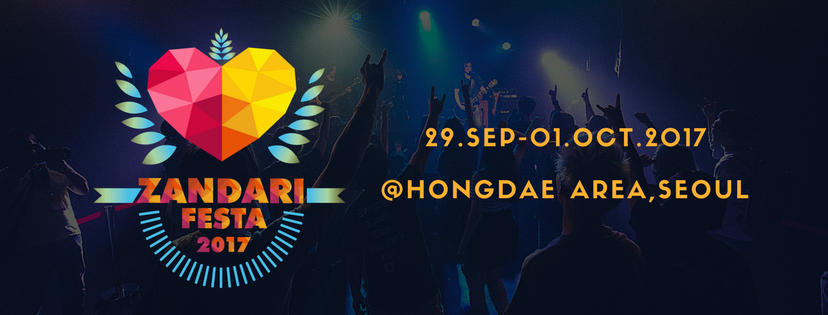Zandari Festa 2017: A Reportback From South Korea’s Premier Music Showcase Festival
Zandari Festa started in 2012, the year I arrived in Korea, and it took me until this year to finally make it there, checking out the last two days of the annual festival that took place September 29-October 1, 2017 at various music venues in the independent music epicenter of Hongdae, Seoul. By now, the festival has become a full international collaboration, with a wide variety of music festival directors and others within the industry descending on the area, not to mention musicians from around the world. For those of us still tapping into the local Korean scene, it is exciting enough to catch live sets from a large number of bands all in one weekend, which usually takes years to accomplish, especially when not living in Seoul. In an effort to introduce some of these talents to those still searching for new music, I chose to sit down and talk with three Korean bands that I know and enjoy.
Genius (Busan)
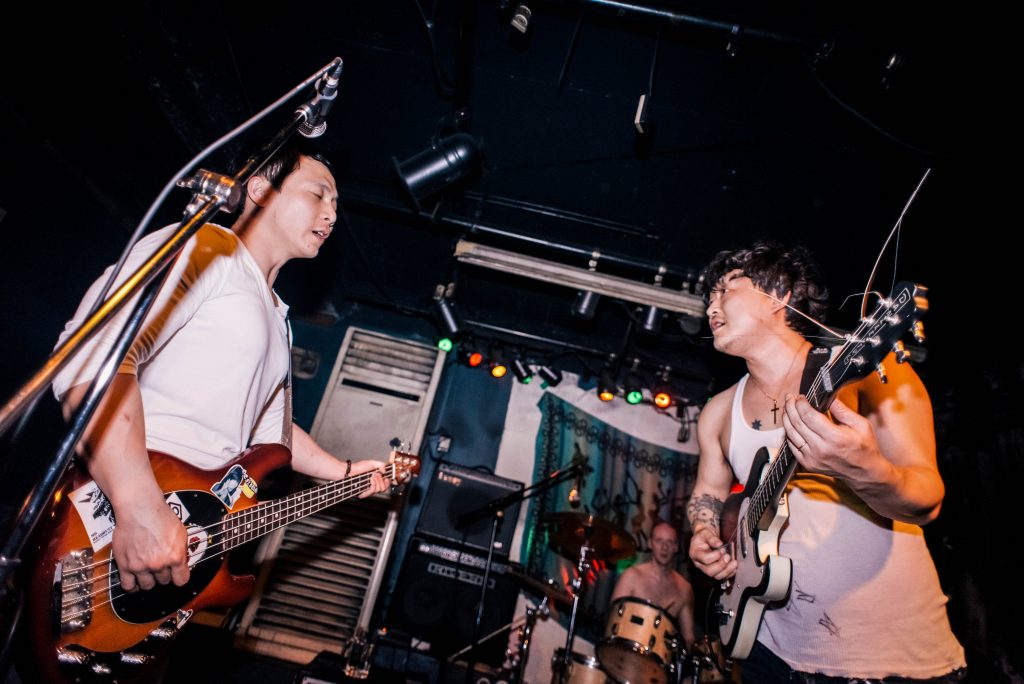
One of the oldest rock bands in Busan, known throughout Korea for their upbeat live shows and prolific musical output, Genius is longtime local guitarist, vocalist and songwriter Kim Il du, and US expats bassist Steve C and drummer Lee Chung Mok, also known as Casey. On August 1, Genius released their fourth album 별바다 (Sea of Stars), with accompanying music videos for the songs “너나나나,” “2226” and “They Were Good.” For their second appearance at a Zandari Festa, they drove up from Busan on the morning of Saturday, September 30 to play a 9 p.m. set at Hongdae’s Club Steel Face. I caught up with them after the show, on the quiet rooftop of the building, before their late-night drive home.
How was the show tonight?
Steve C: Eight starfish. Eight out of ten octopus.
Lee Chung Mok: It’s like apples and oranges but not.
You have a show coming up in Busan?
Steve C: We did one release show. It was very expensive. We felt it was a bit alienating to our audience so we’re going to do one again, next week [October 7] at Basement [longtime Busan venue].
[to Kim Il du] How did you feel about the show tonight? He drove all day.
Kim Il du: I’m happy to go home.
Have you played Zandari before?
Steve C: This is our second time.
Lee Chung Mok: I remember something about Strange Fruit.
Steve C: It was, like, four Busan bands. We came up together. At that time, it did not have all these international connections. So it felt just like a regular show.
So it’s changed a lot in that way?
Steve C: Oh it’s changed so much and so quickly. It’s kind of amazing. My impression was of that, four or five years ago. So maybe these guys did not want to come up as much as I did.
Lee Chung Mok: I played last year so I don’t know. It was almost déjà vu. I played with (another well-known Busan band) Say Sue Me right there. The same spot. The same drums. So I was like ‘oh wait a minute, I’ve been there before.’
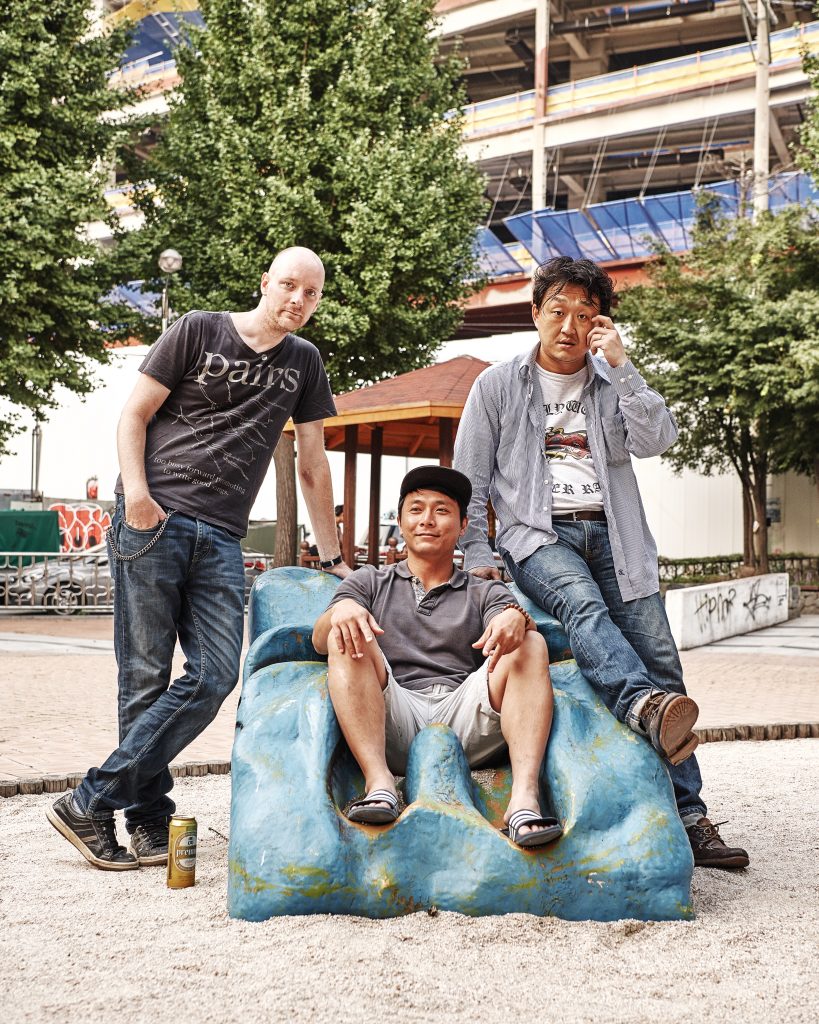
Kim Il du is the main songwriter on this album. Is there any particular inspiration for you?
Steve C [to Kim Il du]: Yeah, why did you write these kinds of songs?
Kim Il du: I don’t know. I just follow my instinct.
Lee Chung Mok: He’s been saying that for years now and I think it’s pretty true.
Steve C: It shows his growth, his age and maturity at the same time. I went back and listened to Yangatchi [first album] today, to practice this morning and I was like holy f***! We were playing so fast. It’s kind of insane. It’s really fun. It’s really nice. I like that energy.
This is your fourth album. When you guys first came together, did you think you would keep going this long?
Lee Chung Mok: I never thought about the future, to be honest. I have a problem with that. I can’t see the future. We were in a different band and that broke up and Il du said, ‘do you want to play more?’ and I said ‘Yeah’ and he said ‘Ok man, follow me.’ And that was it. I keep following him. I don’t think about the future but we keep playing.
Steve C: For me, I just think about the next show. What’s the next show? It would be really nice if we could tour internationally. That’s my plan. I think that’s what we need to do. Korea is a dead end for indie rock music. You can only expand so far.
[to Kim Il du] Do you think that playing with foreigners changes your perspective on the music or is music a language that everyone speaks?
Kim Il du: They are Casey and Steve and Andy [first bassist] to me, not foreigners.
Lee Chung Mok [to Kim Il du]: For Koreans, age is important, right? So when [Seo] Chang-won [second bassist] was in the band, 막내, you kept calling him magnae, right? When you play with foreigners, do you forget about the age thing? Do you feel that Steve and I are your 동생 dongsaeng? It seems like no.
Kim Il du: When we first met, I cared about age because I cared about ego. [laughs]
Lee Chung Mok: I call you Uncle Il du but it’s just a joke.
Kim Il du: If I don’t think about ages, I can make more good ideas with my friends.
Steve C: When you play with foreigners, do you think ‘I should make songs for foreigners?’
Kim Il Du: No, I made it for us. If you guys understand my language, OK. Maybe you guys don’t understand my Korean.
Lee Chung Mok: When I saw you play with Nanbongkundle way back when, you were writing English then too.
I’ve heard some Korean bands say that in Korean it doesn’t sound as good. How do you feel about that?
Lee Chung Mok: With songs like ‘Puppy is Not My Friend,’ [from 2010 album Birth Choice Death] yeah the title is in English but if the other words were in English, that would be weird. I’m used to whatever that sound is. If you feel like Korean, you write in Korean. If you feel like English, you write it in English. How do you choose?
Kim Il Du: I don’t know.
Steve C: Some jokes or some things don’t translate because of the details. But one thing is, he’s not writing for an international audience, he’s writing for us. So sometimes a lot of his lyrics are inside jokes or on a level that we can understand but other people don’t. So there’s some kind of art to it.
Lee Chung Mok: To be honest, I think most of Il Du’s English lyrics are better than most f****** American bands right now. Like what, Justin Bieber writes good lyrics? F*** that!
Kim Il Du: I have no knowledge about English.
Lee Chung Mok: His ideas are interesting.
Kim Il Du: I ask Casey and Steve.
Lee Chung Mok: Sometimes. Not often. You have your own idea and it’s pretty set.
Steve C: Some of the best manipulators of English language are second or third language English writers. Joseph Conrad, Vladimir Nabokov.
That’s quite a comparison there.
Kim Il Du: When I use Korean, maybe it’s heavy and dark and something is wrong, but when I use English, because I don’t know English..
Lee Chung Mok: Simple. But also interesting ideas though.
Steve C: The level of the English, it’s kind of magical. He’s writing it for us. So the grammar is not perfect, but because his ideas are good, you can feel that there’s some kind of artistry behind it. It’s almost listening to Fragments of Sappho. It’s not like a full poem but you see ‘oh s***,’ this works really well with this.
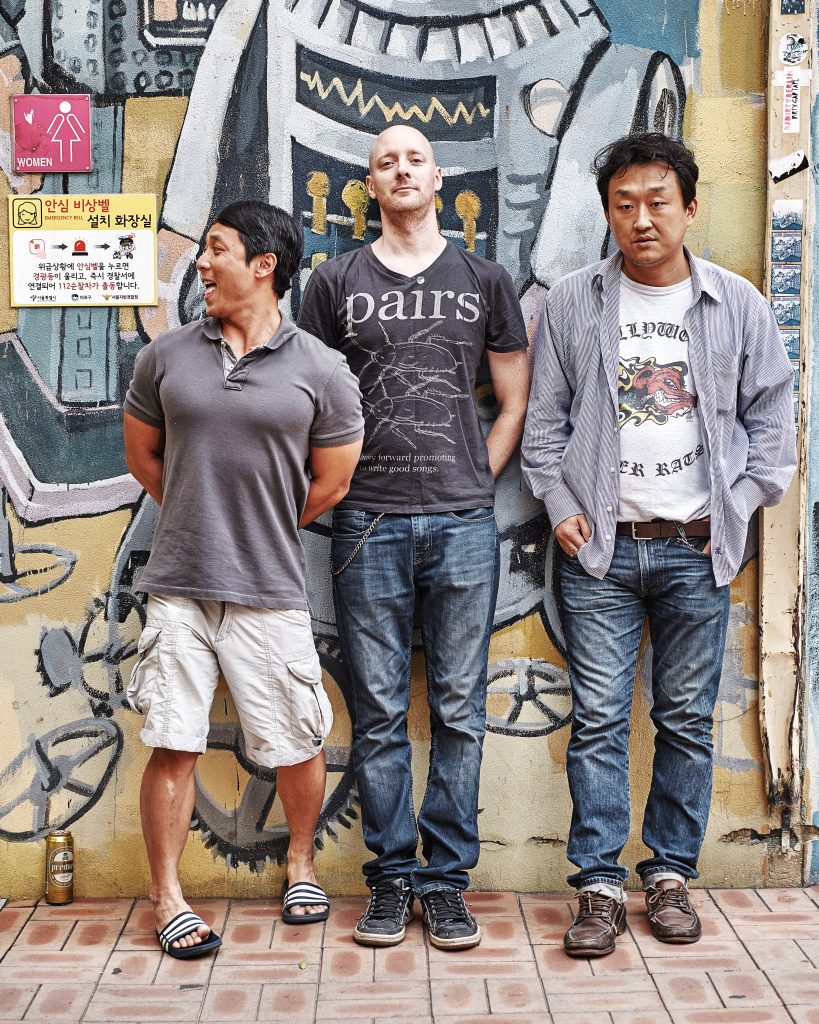
I don’t know the first reason why you guys came to Korea, but is playing music the reason you keep staying here?
Steve: It’s a big reason why I’m still here.
Casey: Me too. If we weren’t playing together, I’d probably in f****** France right now, I don’t know.
Steve: It’s really difficult to play music that you do not believe in. We’re quite fortunate that we found somebody that we could get behind. We believe in his fucking music. We believe in what he does. It’s quite magical.
What is the story behind the name?
Kim Il Du: The name was not important. Just I said ‘Genius.’
Steve C: Yeah I don’t remember the situation. It was Mamason first and then we changed but I don’t remember why or how. Andy left.
Kim Il Du: I think I wanted to give a new feeling.
Lee Chung Mok: I agree, when Steve joined I wanted to change it again. We tried. We tried to think of new names but it was so f****** hard.
Steve C: We were almost Still a Virgin for a while.
Lee Chung Mok: Oh yeah, there was a whole list of them.
Steve C: For me, it is not a declaration of fact but a statement of intent. If we are not Genius now, Genius is what we aim for. That’s our destiny.
Kim Il Du: When we walk on the street, if I see a unique person, I feel strange.
Lee Chung Mok: You want to fit in, you want to be normal?
Kim Il Du: Yeah, just normal.
Lee Chung Mok: Genius is a hard name to find online. It’s normal.
Steve C: I want to change it so bad for that reason. In Google search, so much comes up before us. So just for pragmatic reasons, I want to change it. That’s what we are, so we can’t change it. One of the first reviews of the new album I saw was one Korean guy who said ‘These guys are not genius, they have just regular IQs.’ [laughs]
Lee Chung Mok: Fooled that motherf*****. I’m way below regular.
Steve C: He was right. We’re just regular guys with dreams and ambitions.
Follow Genius and 김일두 on Facebook:
https://www.facebook.com/GeniusRock/
https://www.facebook.com/iamkimildu
Purchase their streaming albums on their Bandcamp: https://geniusxisxrock.bandcamp.com
57 (Jeonju/Seoul)
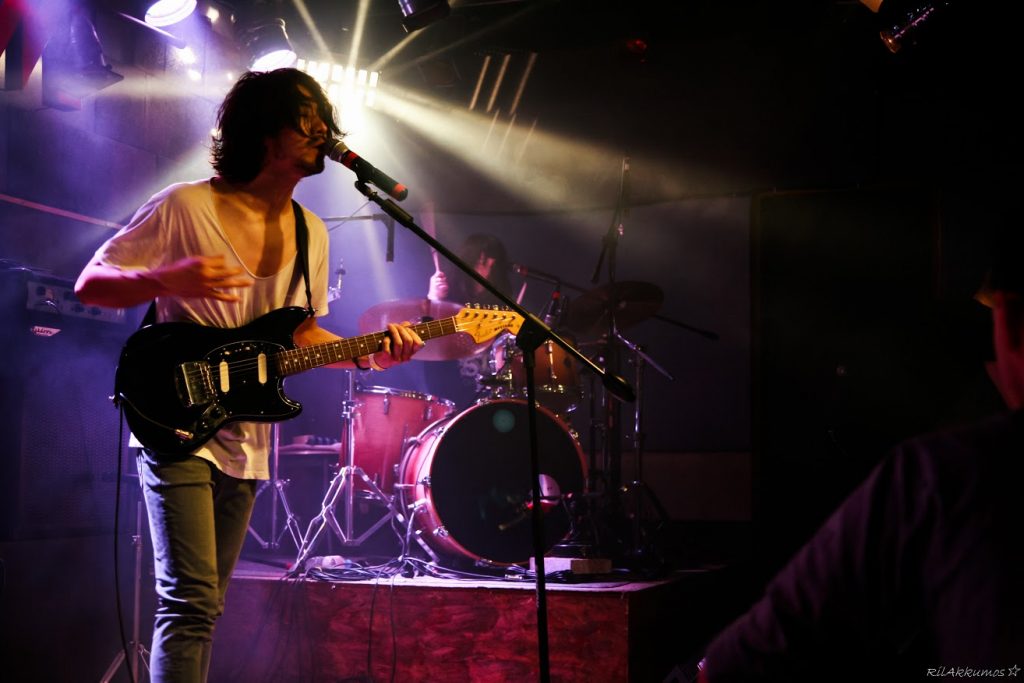
Rising stars in Korean indie rock, 57 (pronounced 오칠oh-chil in the Korean way) are a loud and dynamic rock duo made up of drummer김설 (Snow) and guitarist and vocalist 윤준홍 (Jun). Out of the remains of their previous band in their hometown Jeonju, they began to play with two members and moved to Seoul in May 2014, remaining a duo to this day. In 2016, I saw 57’s live performance at the April 30 Big Day South festival at Gwangju’s Club Nevermind and have followed them ever since. This year has seen them break into the international scene, with an extensive early summer tour in Europe and a US tour from early October through the end of November. I caught up with Jun and Snow just before their 6 p.m. set at Club Steel Face on Sunday, October 1.
You just finished your first European tour this past June. What are some of your most memorable moments from that experience?
Jun: Our European tour was just driving ourselves. Hard driving, camping and sleeping on the road. We did our best. We met a lot of friends in the UK, France, Germany and Poland that helped us. We appreciate that and they gave us good memories.
You have played Zandari Fest since 2014. How has the festival changed?
Jun: Zandari and us, we are growing up together. The festival has invited more global musicians and delegates and it’s getting bigger and there are growing connections between overseas and the domestic scene. I think next year it will be even bigger.
Do you think it’s good for the Korean music scene?
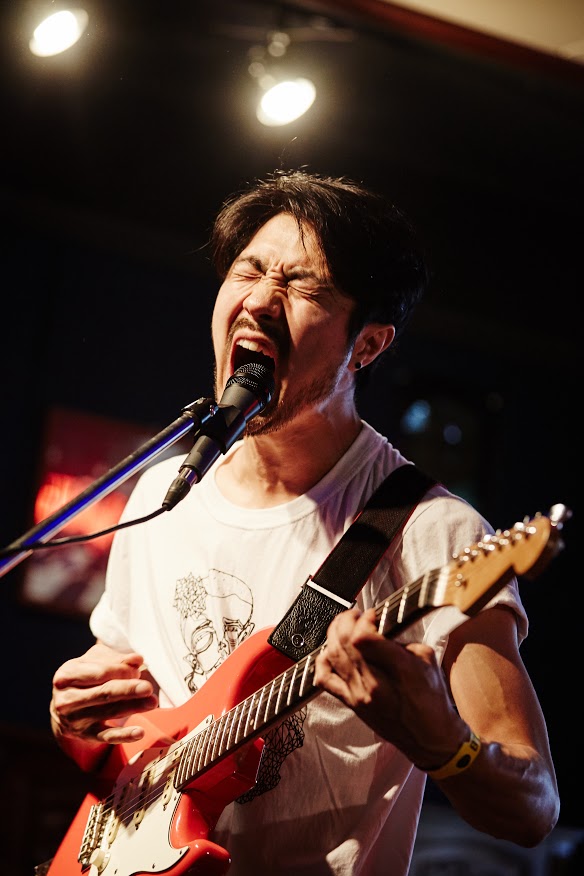
Jun: I think, with this movement, some Korean bands are interested in other countries, it is good but if they are not interested, it’s nothing. It’s just a festival. Not everyone wants to see international bands. People’s thoughts can be different.
In just four days, you are starting your first US tour. What are your expectations for American audiences?
Jun: My expectation is what kind of food we will eat and then what kind of audiences and friends will we meet. The other band touring with us, Barb Wire Dolls, said that there are so many people there so if you want someone to listen to your music, come to the USA. That is a big thing because Korea is really small and sometimes it’s really tiring to think ‘what am I doing here? What is my goal?’ For that reason, we looked for friends in Europe.
Since moving from Jeonju to Seoul in May 2014, did you always plan to play overseas or was that an unexpected thing?
Jun: The first time we moved from Jeonju to Seoul, we had high expectations ‘oh we can play a lot of shows there!’ But we’ve stayed three years and some clubs and festivals have closed. So we started moving to other countries. But now it’s good with Zandari and others, the movement is getting better, I hope.
How has your music evolved since you first started?
Jun: That is really important because we are getting older, but that doesn’t matter. I’ve become more focused on my music and making it a seriously big part of my life, these days. I want to naturally mix our music and life, to be just a musician. But nowadays, we are working other part-time jobs, practicing and playing gigs. It’s a really tiring life.
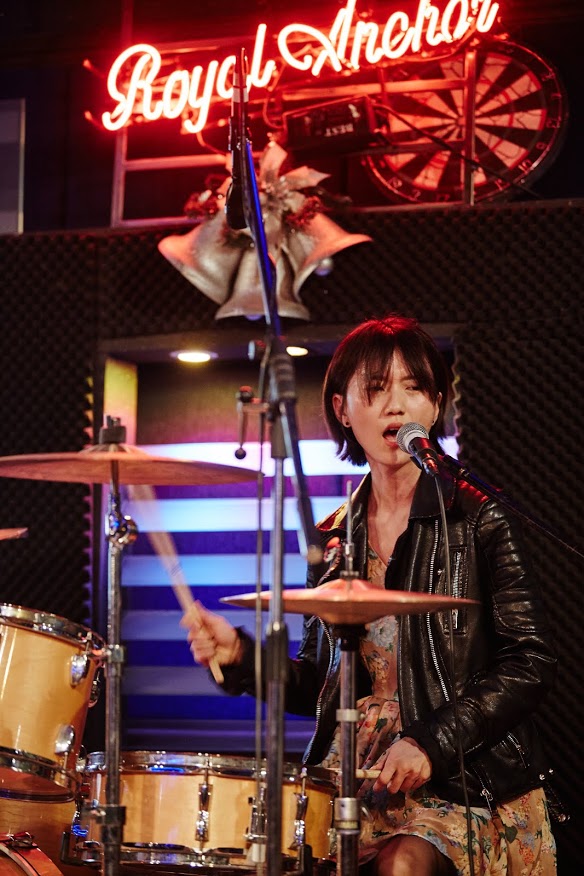
Snow: Me too.
And that’s reflected in the music style as well?
Jun: Music style is a little bit different. At first, we wanted to play lengthy songs but these days we want to find simple melodies and short length, three or four minutes.
Besides the US tour, what are your near future plans for the band?
Jun: After finishing the US tour, I will re-arrange our music and we need to make an album.
What advice would you give to independent musicians, either in Korea or another country, trying to reach a bigger audience?
Jun: We need advice, please! [laughs] Let’s try in our own ways. Share energy and synergy with other musicians and feel happiness on stage and practice with touring.
Do you think there is a big difference between foreign and Korea bands and audiences?
Snow: I think they are very similar.
Jun: The difference in feedback is that Korean audiences are very shy but foreign audiences always say directly ‘you’re good’ or ‘you’re bad.’ I love that. Sometimes I get hurt and sometimes I’m really happy. We grow really fast if we are checking ourselves.
Follow 57 on Facebook: https://www.facebook.com/duo57/
Purchase their album on Bainil: https://www.bainil.com/album/244
PAKK (Seoul)
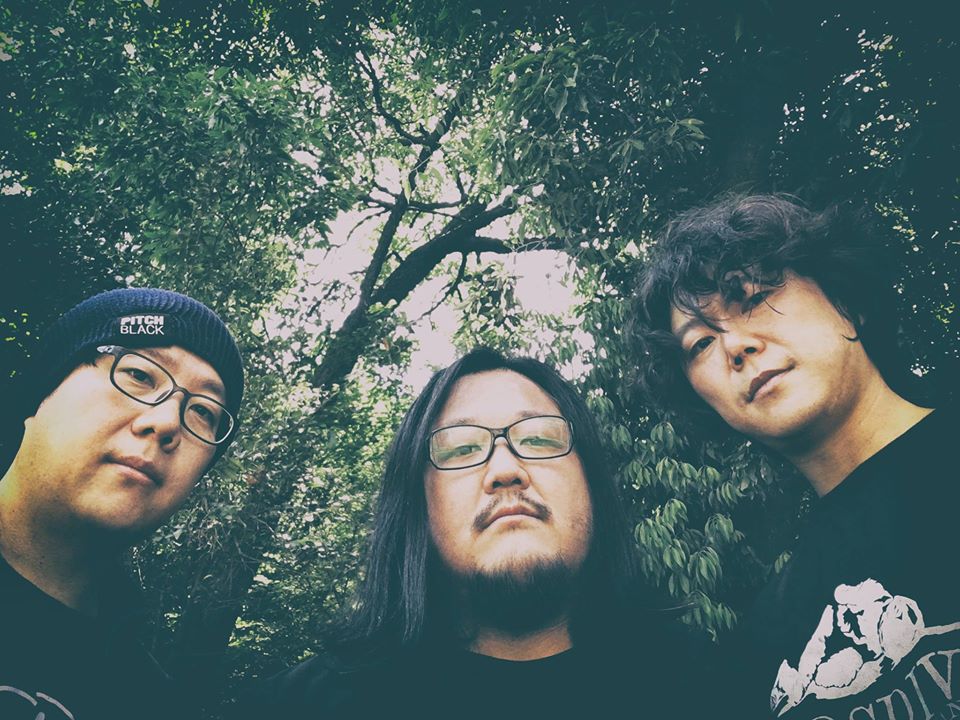
PAKK is a heavy rock trio, with elements of post-rock, grunge and minimal psychedelic, started in Seoul in May 2014 by guitarist and vocalist Kim Dae-inn of Jellyboy and Apollo 18, with Kim Tae-ho on drums and Park Hyun-seok on bass. After the March 2016 release of EP 곡소리 A Wail, recorded at Gwangju’s PeakMusic studio in Sajik Park next to the GFN station, the band went back into the same place and came out with their first full-length album 살풀이 Salpuri in August. I caught up with PAKK at a Hongdae cafe before their October 1, 9 p.m. Zandari set at Club Crack.
This is your third Zandari Festa. It seems to have gotten a lot more international. Do you think it helps the Korean scene to reach a bigger audience?
Kim Tae-ho: I think Zandari becoming such in international festival is a good thing and good for us to play with so many international bands.
Kim Dae-inn: Zandari is giving many opportunities. It’s good to see a development in an exchange of showcases.
The cover for your latest album Salpuri is very visual, traditional Korean and even violent. Do you have influences outside of music, such as film?
Kim Dae-inn: In my case, I am very influenced by movies. I like them very much so for me it is like that.
Kim Tae-ho: For me, it’s not so much outside influence, but just in performing with the other two members of the band, it’s not a feeling of playing the bass but sending a melody.
Kim Dae-inn: When we are making music, we jam.
So ideas are born from the collective jam session?
Kim Dae-inn: Yes. It’s different every time. We influence and change each other.
Was Salpuri difficult to record or did it come naturally?
Kim Dae-inn: The EP album and this one too, we recorded in one take. Only the guitar part had a little overdubbing. I think one take is very powerful but very hard, especially the drum part.
Is there a difference between foreign audience reactions and Korean audience reactions?
Kim Tae-ho: Foreigners seem more sincere and comfortable.
Kim Dae-inn: Foreigners have more feeling and are more active. Koreans are more static.
What are your plans with the band? Will you continue touring with this album in the near future?
Kim Dae-inn: We plan to perform at Naver Onstage, Janganpyeong Car Festival – not a rock festival, just a regular festival. In December this year, we will go to Gwangju one more time and play in PeakMusic. Next year we want to play bigger festivals like Ansan and Pentaport. And if we have an opportunity, we have a plan for overseas performances. Please keep an eye on.
I haven’t heard of too many bands outside of Gwangju recording at the PeakMusic studio. Coming from Seoul, how did you build the relationship with them?
Kim Dae-inn: Many bands in Seoul don’t know the PeakMusic recording system. We made the EP there and liked it. The recording booth is huge. I like the sound of the drums. And the air is really good because there is a mountain behind the Peakmusic.
Speaking of which, you are playing tonight as one of the last bands at Zandari. How are you feeling about that? Any nervousness?
Kim Dae-inn: No, not nervous. Totally powerful but a little bit sleepy.
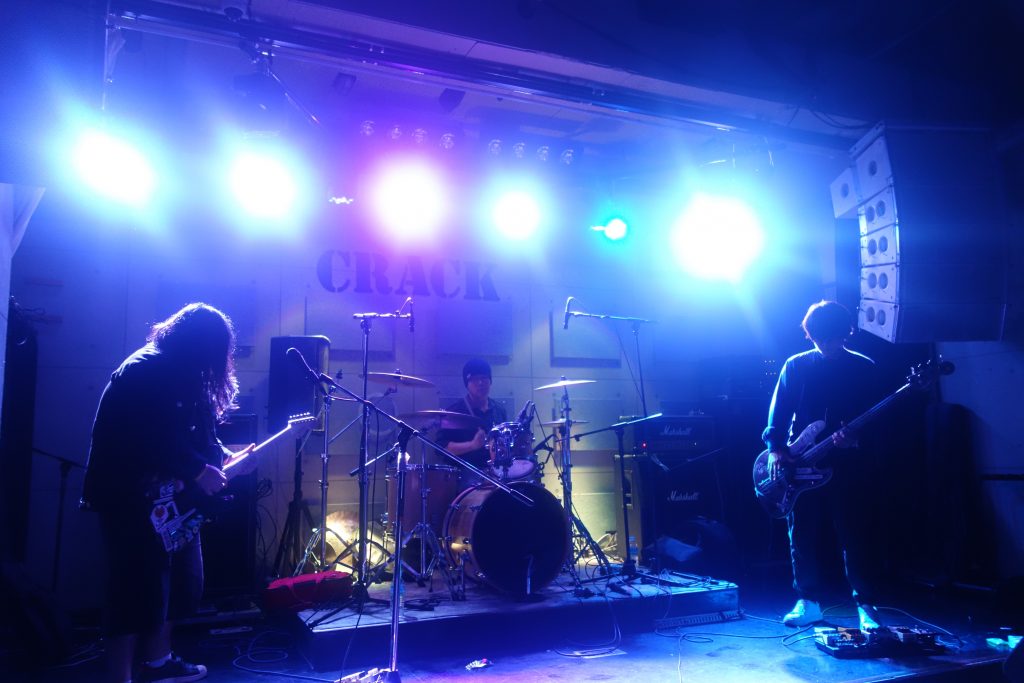
Can you talk about the relationship between your music and the traditional Korean album title Salpuri?
Kim Tae-ho: Salpuri is one of the folk performance styles in Korea. We don’t consider ourselves as folk but actually there is a process. The EP’s name is goksori [a wail] which is a sad feeling. This salpuri meaning is about exorcising bad things through making this kind of traditional ritual. We don’t know yet what the next album will be but it may continue the same relationship or it could be another story. Anyway, that is salpuri.
Follow PAKK on Facebook: https://www.facebook.com/pakkband/
Purchase Goksori and Salpuri:
https://electricmuse.bandcamp.com/album/a-wail
http://mirrorballmusic.co.kr/albums/33595/#sthash.TXeN6wTl.dpbs
Stay tuned for PAKK’s upcoming Gwangju show on December 9.







